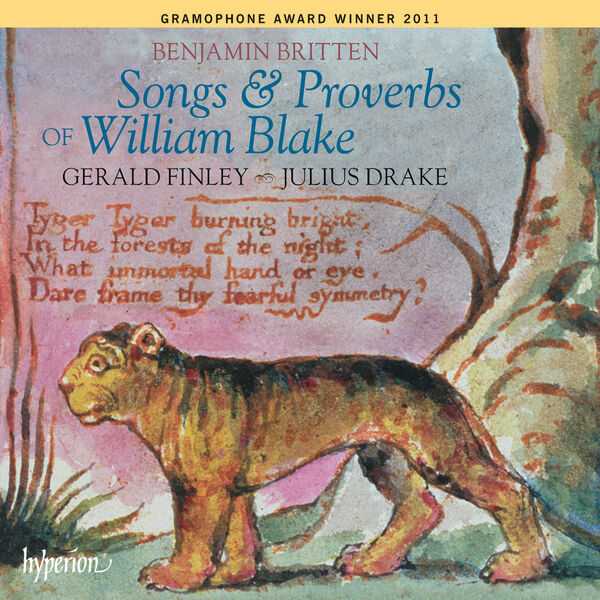
Composer: Benjamin Britten, Charles Dibdin, David Owen
Performer: Gerald Finley, Julius Drake
Format: FLAC (tracks)
Label: Hyperion
Catalogue: CDA67778
Release: 2010
Size: 242 MB
Recovery: +3%
Scan: yes
01. anon.: Lemady
02. anon.: She’s like the swallow
03. anon.: I wonder as I wander
Dibdin: The Oddities
04. Song. Tom Bowling
Britten: Songs and Proverbs of William Blake, Op. 74
05. I. Proverb I
06. II. London
07. III. Proverb II
08. IV. The Chimney-Sweeper
09. V. Proverb III
10. VI. A Poison Tree
11. VII. Proverb IV
12. VIII. The Tyger
13. IX. Proverb V
14. X. The Fly
15. XI. Proverb VI
16. XII. Ah, Sun-flower
17. XIII. Proverb VII
18. XIV. Every Night and every Morn
Britten: Tit for Tat
19. I. A Song of Enchantment
20. II. Autumn
21. III. Silver
22. IV. Vigil
23. V. Tit for Tat
24. Britten: Um Mitternacht
25. Britten: A Poison Tree
Britten: This way to the tomb
26. I. Evening
27. II. Morning
28. III. Night
29. Owen: David of the White Rock
30. anon.: Greensleeves
31. anon.: The Crocodile
32. anon.: The Deaf Woman’s Courtship
33. anon.: Bird Scarer’s Song
The unbeatable, multi-award-winning partnership of Gerald Finley and Julius Drake turn to the composer Benjamin Britten for their latest Hyperion release.
Although Britten is particularly celebrated for the substantial body of music he composed for the tenor voice, the composer also left an important legacy of music for baritone. Characteristically, Britten’s output for low voice was also inspired by the talents of specific performers with whom he was closely associated, among them Dietrich Fischer-Dieskau and John Shirley-Quirk. In addition to song-cycles, individual songs and folksong arrangements, Britten wrote challenging baritone roles in operas as diverse as Billy Budd (1951), Owen Wingrave (1970) and Death in Venice (1972)—the title role of the second of these made very much Gerald Finley’s own in his magnificent interpretation in Margaret Williams’s 2001 television film of the opera.
This disc contains Britten’s two important song cycles for baritone: Tit for Tat, setting the poems of Walter de la Mare, and the more substantial and challenging Songs and Proverbs of William Blake. The latter was written for Dietrich Fischer-Dieskau; designed to showcase his unique blend of intense lyricism and dramatic characterization, qualities which are undoubtedly also exhibited by Gerald Finley.
Also included are some of Britten’s popular folksong settings, and a selection of later songs, which received exposure and publication only after the composer’s death in December 1976.
Gerald Finley’s collection of music for baritone by Benjamin Britten includes two songs cycles, Songs and Proverbs of William Blake (1965), written for Dietrich Fischer-Dieskau, and Tit for Tat, student pieces using texts by Walter de la Mare, given its premiere in 1968 by John Shirley-Quirk. There is also a generous assortment of folk song arrangements and settings of texts by Goethe, John Hughes, and Ronald Duncan. These songs testify to the range of Finley’s skill; he brings to them the same interpretive thoughtfulness and insight he gives his operatic roles, and he entirely avoids the overly articulated mannerisms that frequently afflict classically trained singers when attempting music that is rooted in an earthier, folk tradition. It is one of his singular accomplishments that he demonstrates with startling clarity the extent to which the Britten art songs, for all the sophistication of their construction, are melodically rooted solidly in British folk song. The result is an album with a satisfying stylistic consistency, with no artificial demarcation between high and low art. The songs showcase the breadth of Finley’s interpretive expertise, from the genuinely spooky menace of the two settings of Blake’s “A Poison Tree,” to the shameless silliness of “The Crocodile” and “The Deaf Woman’s Courtship,” and the ardor of “Lemady” and “Evening.” Finley’s creamy baritone is sleek but rich, and the aptness and control of his phrasing are a marvel. His tone, which he shades with infinite variety in his sensitivity to the text and music, is consistently gorgeous. He and his longtime collaborator pianist Julius Drake have a confident familiarity that makes the songs fresh with their nuanced spontaneity. Hyperion’s sound is clean, clear, and lively, with a good sense of presence.